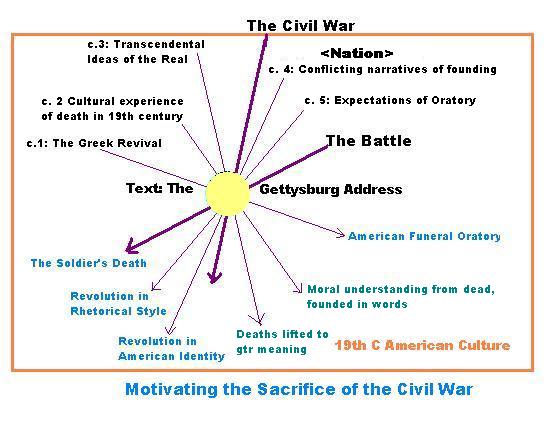Study Abstracts
Wills'
Lincoln At Gettysburg
With the Wills book, you now have three different ways to read a book that you have learned over the semester:
- You typically read a textbook for its content. When you take notes on what you are reading you try to summarize the content in your own words.
- I have suggested that you read Reid and Klumpp differently. An anthology provides you texts of discourse for you to analyze as you learn. You want to take the material from lecture and use it to analyze the speeches in the anthology. Your abstracts may read the "Commentary" on each speech the way you would a text, but they should "read" the speeches in terms of the lectures.
- Now we reach a third style of book with Wills. Wills book is not a summary of knowledge such as a textbook is, nor simply a reproduction of a text as an anthology provides. Rather, his is a book that makes an argument about Lincoln's "Gettysburg Address." You will want to read it as an argument appealing to your judgment of the speech. I recommend that you:
- Look for the thesis (main argument) of the book, and then of each chapter. Each chapter in the book is about a different influence on the speech. Note the influence for that chapter. For example, chapter 1 is about the influence of rhetorical theory, particularly the theory of the Greek funeral oration, on the Address.
- Read for the material that Wills provides you as background for his argument in each chapter. For example, when he talks about Gettysburg and the Culture of Death, what does he tell you about the 19th century culture of death?
- Follow this background knowledge into the speech. For example, how was the speech different because of the culture of death? Read this influence as an argument to persuade you that the element he discusses in the chapter influenced the speech at Gettysburg. Does he convince you? Why? Why not?
Because Lincoln at Gettysburg is written as a argument for a thesis, abstracts of the chapters are particularly helpful in studying later for your examination and for retaining the essence of Wills' argument. I suggest you prepare abstracts for each of the major chapters of the book (1-5). In doing so, answer the following questions for each chapter:
- What is the thesis (the main claim) of the chapter?
- Each of the chapters talks about a characteristic way of living or thinking in the Civil War era. Then it maps the influence of that characteristic on the Gettysburg Address. What characteristic is discussed in this chapter? How did it influence life in the time?
- How did the influence track its way into the Gettysburg Address? How did it change the Address? How did the influence shape Lincoln's crafting of the Address?
Wills' approach to his examiniation of the speech is what we call "contextualist criticism." The contextualist views a speech from this perspective:
The speaker gathers from the character of the culture of his/her time, and brings that character to bear on his audience's understanding of the meaning of the historical moment.
Thus, each chapter in Wills focuses on different characteristics of 19th century culture, the way they have affected the audience at Gettysburg, and how Lincoln drew upon that cultural characteristic in formulating his speech. Furthermore, Wills argues that Lincoln's words at Gettysburg altered the culture even as he drew upon it. So, what you want to do in your abstract for each chapter is capture this logic. The questions sheet will help you. So might the following depiction of the logic, indicating how Wills, as a contextualist, writes about the speech.:

I would recommend abstracts of 1/2 to one page on each chapter.
Return to the COMM 460 Home Page